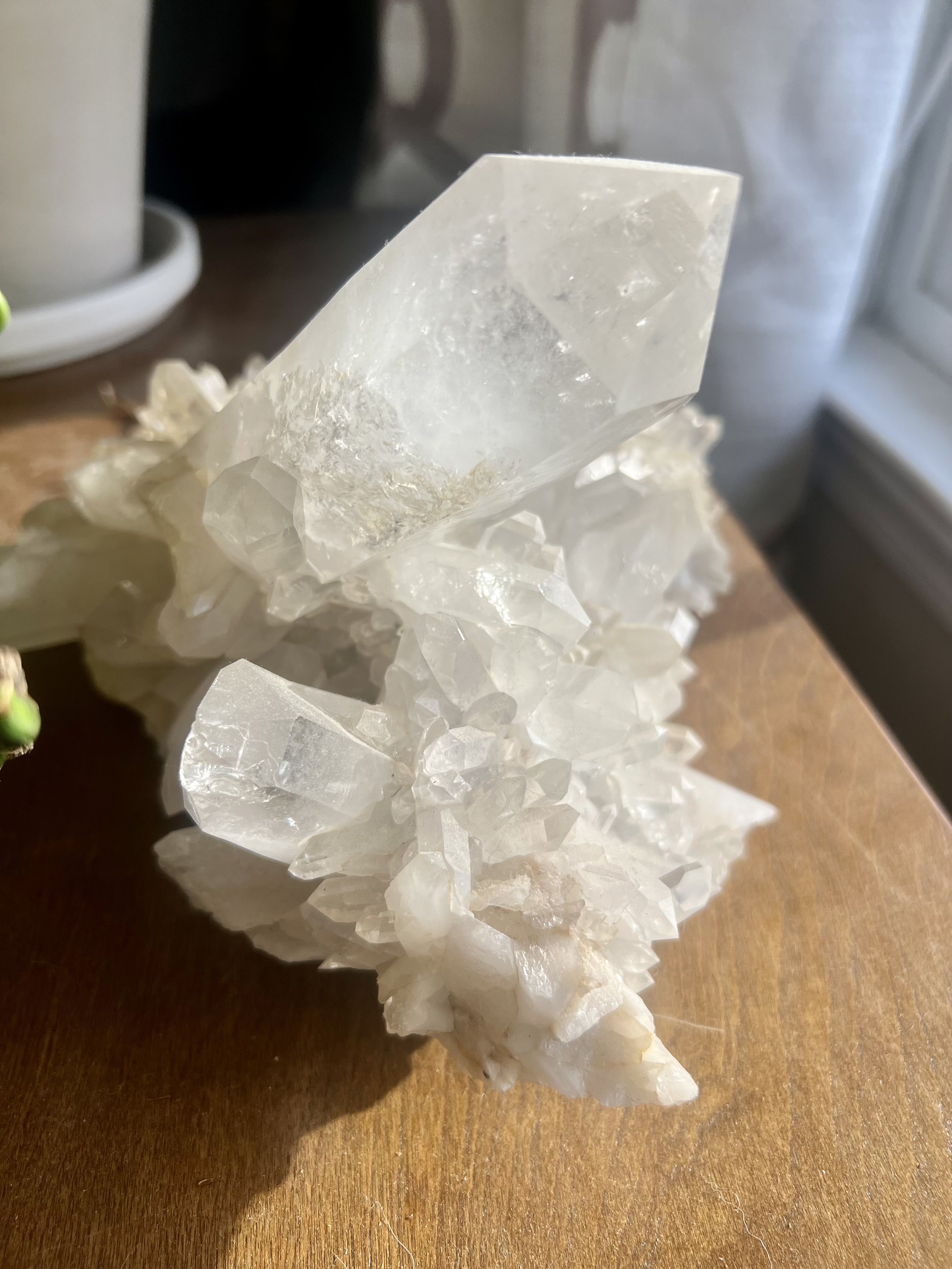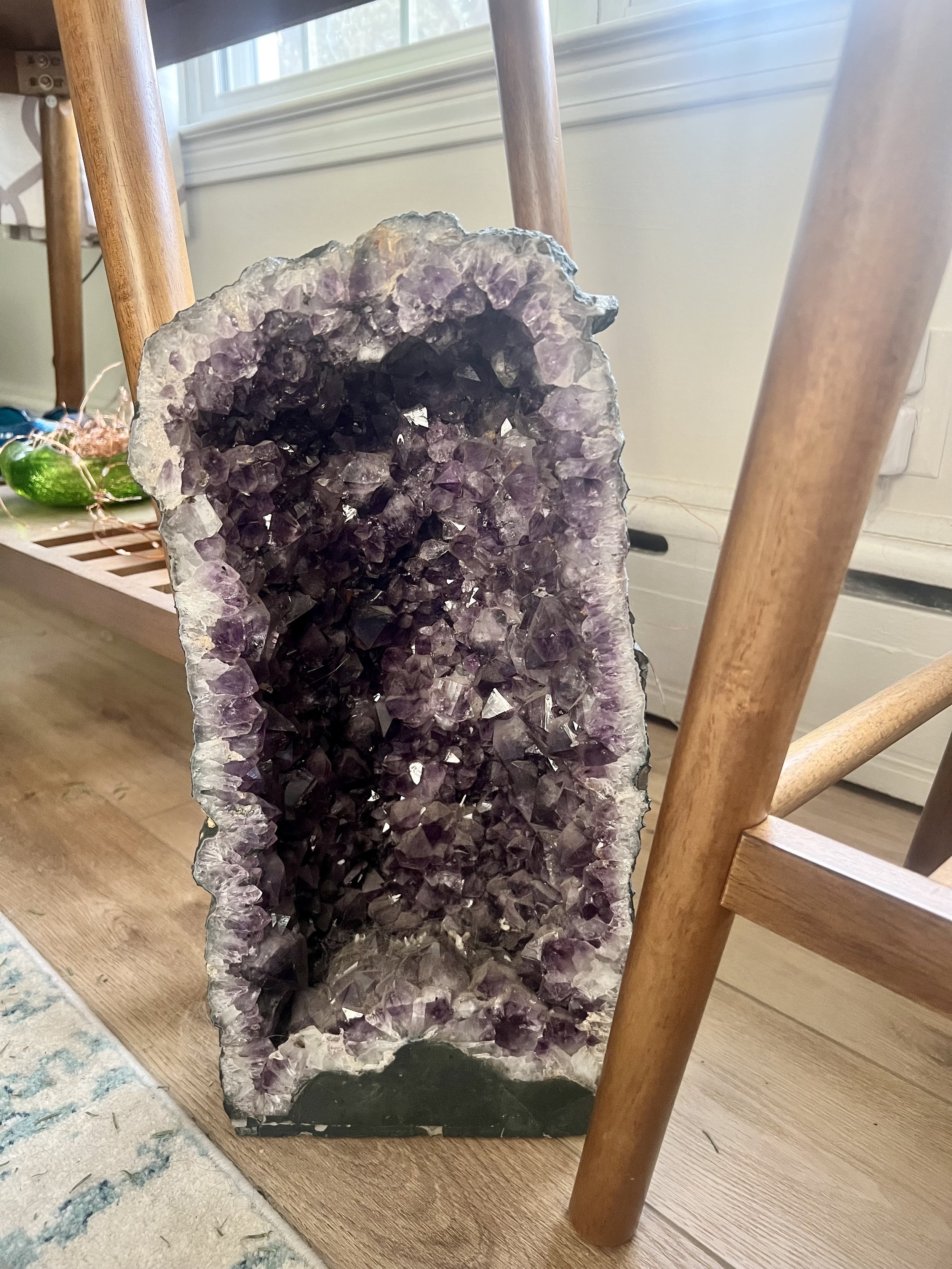cracks
Three years after I was rejected for the priesthood, the pain of never being allowed to consecrate communion rose from the deep where I had buried it. I was on a Zoom call with a group discerning Holy Orders. I introduced myself to our guest, a priest, by saying that since the priesthood had been ruled out for me, probably I was meant for lay ministry, but I wasn’t sure about diaconal ministry.
As our guest told her story, she said she was called to service, which is more diaconal, and called to the Eucharist, which is reserved for priests. I broke.
I remembered my longing to consecrate, my deep knowing that God could come through me to create this holy sacrament. I remembered the afternoon, several years ago, when I sat alone in a sanctuary and opened myself to God. “Here I am,” I said aloud. “What do you want me to do?” The answer came immediately, clearly, succinctly: “become a priest.” In the Zoom meeting, I felt my body, my posture, change when I talked about wanting to lead a service of Holy Eucharist at an energy vortex in Sedona. I remembered how that physical change happens every time I talk about consecrating.
How could I have disregarded God’s clarion call?
I went through a formal discernment process, beginning with my parish and ending with the diocesan leadership. A handful of priests and many lay people perceived my call; the bishop and Commission on Ministry did not. Was I wrong? Did I hear “priest” when God meant “deacon”? Does a priest have to be ordained? Does a human have to ordain me? God has ordained me, and I’ve told myself to be satisfied with that. But I’m not.
In September I began a program for lay people to discern God’s call; I had to stop waiting for a lightning bolt, another clarion call, and figure it out. After one session in December, I sent a friend this snippet from my journal with three questions to pray about and my answer:
“I carry the seed of Christ’s love in my heart—that’s my being,” I wrote. ”But I’m still passionately trying to discern what I’m called to *do.*”
“Oh my dearest one, you ARE pregnant with Jesus and a bearer of the seeds of the gospel. Could it possibly be spiritual direction and/or a call to the diaconate? Your soul is restless. Something is unfinished.”
I sent her the top of the next journal page:
After Christmas, my husband asked why I was trying to fit myself into an existing structure. “You keep jumping ahead because you’re impatient,” he said.
I exploded (revealing my impatience), “I’ve been doing this for seven years!”
“You can’t rush perfection,” he said. “We don’t have the answers, but making the answers fit what you need to happen isn’t right.”
In my mind, I tried to step out of the existing structure. “What do I want to share?” I wrote. The answer: “God's love. El amor de Jesus.”
Or: (the) love (of Jesus).
If we bring the kingdom of God to earth by being God’s hands and feet and bodies and hearts, that means loving. We can’t bring God’s kingdom to earth with only people who identify as Christian. It will take all of us living from love to transform the world. How do I include everyone who dislikes my religion? In online interactions with strangers, I’ve been struck by how many people hate and mistrust Christianity and God. And they’re not interested in hearing about the positive parts.
“If dislike of God and the bible are keeping people away from Jesus’ message,” I wrote, “maybe I strip away everything but the message. Maybe that’s my call.”
I thought about a few of my favorite prayers and how they connect with love:
”Send us into the world in peace” (Book of Common Prayer p.365)
to love with all our heart, soul and mind,
to put that love into action
to transform the world
“Cleanse the thoughts of our hearts by the inspiration of your Holy Spirit” (Book of Common Prayer p.355)
We send each other, ourselves. We take responsibility; we don’t wait for God to do something that triggers action. We act on a moral imperative. Not because someone told us to, but because we want to transform and heal ourselves, each other, the world
My evangelism is based on “Love one another.” That is what I’ve realized. This is what God has ordained me to do.
I first learned how to connect with God every day when I was studying energy healing with crystals. “Spiritual but not religious” is how I described myself; I believed in God but not necessarily organized religion, and I didn’t have a faith tradition. Nevertheless, when I sat down to begin a massage or healing session, I paused to connect with God. I asked God to send light and love through me into my client.
Over time I came to understand that we humans have a divine core — our God-given, God-created column of pure love and light. As we go through life, we accumulate junk around that core, and then we live from the outer edges of that. My goal as a healer was to help clients shed that junk so they could live closer and closer to their divine core, and my goal for my own healing is to return to that center.
I get that crystals and chakras are way out there for some people. For that matter, I get that God is way out there for some. Substitute “Love” for “God,” and the meaning essentially is the same.
When I began my formal discernment process, I kept my part-time office job but closed my part-time healing practice so I could focus on discernment. That’s what I told myself. But looking back, I believed that working with crystals and energy would kill any chance I had to be ordained.
The week before I broke, the whole discernment cohort (not just those discerning Holy Orders) met. In my five-person small group, I shared that when I held another member in prayer, I offered them up to God on outstretched hands, as I used to do with my clients when I worked with crystals and healing. “Look, God. Look at your beautiful and perfect child.”
A fellow member said they noticed a shift in me when I talked about crystals and healing, and the next day another member texted encouragement to discern how crystals fit into my call. The next morning, sitting drinking my tea, I looked around. I saw crystals. I don’t work with them much any more, but they surround me. They hold God’s light and beauty.
Yesterday my husband mentioned a phrase he’d heard: “Open a crack, and the devil can get inside.”
“Open a crack, and the light can get in,” I said. And then we realized together: Open a crack, and the light inside will break through and clear everything in its path.
The connection in these two things that transform my being — consecrating the Eucharist and healing — is allowing God to come through me.
God the healer as love and light coming through to dispel our darknesses, the fear we live inside of, clearing all the layers we’ve accumulated around our divine core, pushing that away with the strength of pure love.
And God the Almighty coming through me to transform human-made bread and wine into the Body and Blood of Jesus Christ.
Some people believe it truly becomes the Body and Blood of Jesus. I believe it is transformed through God’s energy, and that energy is passed to us in the bread and the wine. Receiving Jesus inside us feeds the divine core’s strength and helps us shed more junk. As the core grows, it will take over room occupied by three-dimensional junk. It must, because it is stronger than fear.
How do I begin?
What’s my first step?
Pray.
And speak. And seek.




